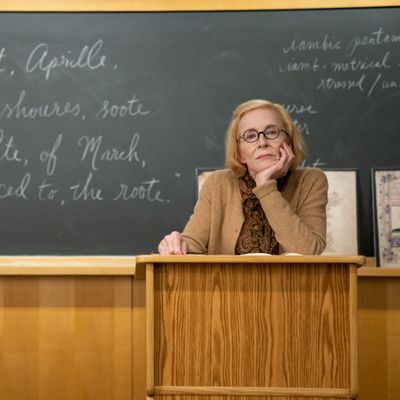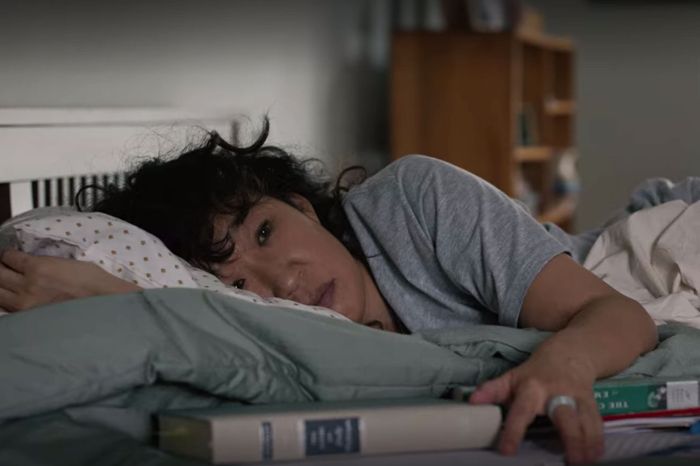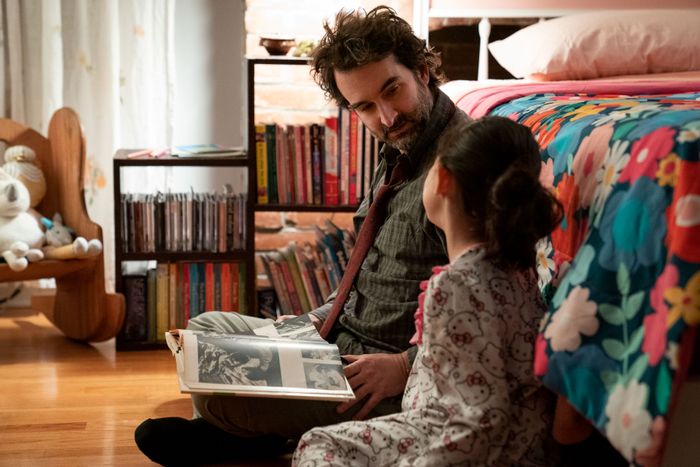
If, as Flannery O’Connor once said, a good story resists paraphrase, then The Chair is well on its way to earning such a distinction. More than simply a chronicle of the trials and tribulations of Professor Ji-Yoon Kim (Sandra Oh), the newly minted chair of the flailing English department at fictional Pembroke College, the series delves into a vast array of territories: free speech, cancel culture, the rigid confines of academia, and the nuances of navigating the workplace as a person of color. Each of the show’s six episodes moves along at a brisk pace, but — fittingly for a story about a group of people who have dedicated their lives to the written word — The Chair’s literary references and allusions reveal another layer of textual richness, from the bookish in-jokes to the literal books spotted throughout the series.
The Collected Works of Emily Dickinson
When she’s not trying to keep her co-workers’ careers on track or tending to her own complicated home life, Ji-Yoon teaches a course on the poetry of Emily Dickinson. “When I started, it was like, Why’s some Asian lady teaching Emily Dickinson?” she says of her early years at Pembroke. Judging by the quotes from Gloria Anzaldúa and Audre Lorde she’s seen working into her class discussions, it appears she’s still trying to figure out how to square her identity with the unbearable whiteness of both the material and the institution she has now been tasked with upholding. Try as she might to make a difference, she has yet to “overcome the tradition of silence,” as Anzaldúa declares, or discover any tools that might dismantle the master’s house.
Asked about her career of choice by her precocious but obstinate daughter, Juju (Everly Carganilla), Ji-Yoon replies, “I wanted to read novels and poems for as long as I could.” True to form, her Dickinson tomes are always nearby — after resisting the urge to sleep with Bill (Jay Duplass), a recently widowed colleague she has long had feelings for, she’s seen waking up with her arm tossed tenderly across her beloved books. The poet herself dedicated reams of passionate poetry and love letters to Susan Gilbert, the woman who went on to marry Dickinson’s brother. “It’s almost like there’s something between the words that she’s not saying or not able to articulate,” Ji-Yoon says of the poem “‘Hope’ is the thing with feathers.” When she and Bill fall back into their witty repartee at season’s end, it’s clear that while their friendship has weathered the semester’s storm, there’s still a lot left unsaid.
Moby-Dick, by Herman Melville
A celebrated scholar with several decades of teaching under his belt, Elliot Rentz (Bob Balaban) spends the semester grappling with the fact that he’s no longer the hotshot he used to be. Perhaps it’s no surprise, then, that Elliot is big on Moby-Dick — evading one’s eventual irrelevance is a quest that could qualify as a white whale of sorts. Rather than attempting to revitalize his courses or connect meaningfully with the handful of students in his class, Elliot uses his departmental clout to undermine the possibility of tenure for Yasmin McKay (Nana Mensah), a young Black professor who packs lecture halls with her modern (well, Hamilton-inspired) approach to 19th-century novels. Single-minded to the end, Elliot makes one last attempt to preserve his position by staging a mutiny to oust Ji-Yoon, the department’s only other woman of color, from her seat of power. “We so appreciate your willingness to step up and steer the troubled vessel that is the English department,” he begins, as Yasmin mutters under her breath, “Here we go, ship metaphors.” Unable to see beyond his own mission of self-preservation, he never quite realizes that even his machinations come with a stale air of predictability.
Frances Harper
Described in glowing terms by her colleagues — the female ones, anyway — Yasmin is seen teaching a course titled “Sex and the Novel,” engaging with students on the social-media platforms they already frequent, and tackling the flawed legacies of famous male authors. She mentions an article she has recently written about Frances Harper, an abolitionist, a suffragist, and one of the first published Black women writers in American history. Harper is the sort of writer who, despite her cultural contributions, is unlikely to be included on the syllabus for Elliot’s “Survey of American Letters, 1850 to 1918,” and Yasmin, who still has to correct her dean when he gets her name wrong, spends the season rightfully bristling against the expectation that she should be thrilled to toil away in obscurity in order to soothe the egos of her aging white male colleagues.
A Midsummer Night’s Dream ,by William Shakespeare
After Ji-Yoon sidesteps bureaucratic protocol to bestow a lectureship on Yasmin, Dean Larson quotes Shakespeare as a reaction to her defiance: “Though she be but little, she is fierce.” He mistakenly attributes the line as a description of Hermione in The Winter’s Tale, before Yasmin — whom he calls Jasmine — informs him that it’s actually from A Midsummer Night’s Dream. Larson clearly struggles to keep women’s names straight, but this mix-up is a layered one: Hermione is a character who remains graceful even as she’s unfairly maligned, railroaded, and driven into an early grave by the play’s male protagonist. It’s hard to imagine anyone characterizing her as “fierce” unless there’s some assumed valor in the ability to maintain composure while an ill-informed man jerks you around. That the line is actually an assessment of a scrappy woman (Hermia) by her longtime friend (Helena) hints at the way the English Department’s female professors will affirm each other’s abilities, even in moments of disagreement.
The Family of Man
A catalog of photographer Edward Steichen’s 1955 exhibition at the Museum of Modern Art, this book is an odd yet strangely apt favorite for Ji-Yoon’s precocious young daughter, Ju-Hee. Known as Juju to loved ones, she’s a spitfire with a knack for gleefully inappropriate remarks, so it tracks that she’s drawn to it, telling Bill frankly, “It has naked pictures in it.” The exhibition itself, however, was meant to be a “declaration of global solidarity” that displayed the “universal aspects of human experience” — all subject matter that’s relevant to Juju, who seems frustrated by the tension between her Mexican roots and her adoptive mother’s Korean heritage. Still, the conversations sparked by the photos are ones that drive home the point that, from birth to death, there are certain commonalities among us that transcend divisions. As Juju flips through the book’s pages, a fitting Sioux saying flashes by, an illuminating meditation on community and chosen family: “With all beings and all things we shall be as relatives.”
The Canterbury Tales, by Geoffrey Chaucer
“This is one of the few professions where you get more respect as you get older,” says Professor Joan Hambling (Holland Taylor), lamenting Pembroke’s efforts to coerce her into retirement. “I mean, one of the reasons I went into this is that you don’t age out.” Her Chaucer course is sparsely attended, but beyond the classroom, Joan’s bawdy humor and reckless commentary are as delightful as her beloved Canterbury Tales. She reveals in episode six that she wrote a book on Chaucer that contained the first feminist reading of “The Wife of Bath’s Tale,” and she even has an image of the character as the wallpaper on her laptop. Chaucer’s take on the battle of the sexes, though more than 600 years old, still holds up — Joan is frustrated by a tradition of sidelining female faculty, which stretches back so far that the statute of limitations has expired on filing a proper complaint with the Ethics and Compliance office. Not unlike the plot of her much-loved tale, a lovely last-minute twist of fate ends up giving Joan some hard-earned and well-deserved sovereignty in the department.



